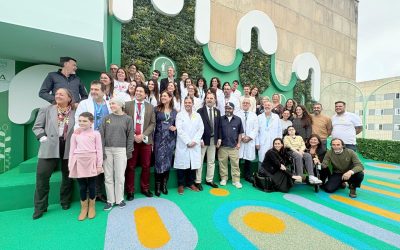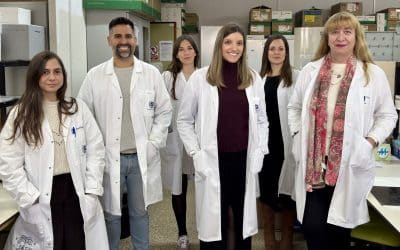-
This team has carried out a study in which they have managed to improve the efficacy of the basophil activation test - a laboratory test with a blood sample - thanks to the inclusion of a bacterial component, lipopolysaccharide, allowing them to detect up to 60% more patients allergic to amoxicillin.
The multidisciplinary Allergy team of the Biomedical Research Institute of Malaga and Nanomedicine Platform (IBIMA Plataforma BIONAND) has published an article in the prestigious international journal Allergy in which they show the results of their research on the effect of bacterial components to improve allergic response. in vitro - by laboratory tests - in patients allergic to amoxicillin.
The work is led by researchers from the Allergic Diseases to Drugs and Allergens group, whose responsible researchers are Dr. María José Torres and Dr. Cristobalina Mayorga.
Amoxicillin allergy is not only one of the most common diseases in the population, but the number of people affected continues to grow due to the ever-increasing prescription of this antibiotic. The diagnosis of this allergy is made by means of provocation tests, which involve the administration of increasing doses of the drug in question, which entails a risk for the patient in the case of severe reactions. Other tests, such as skin tests, which are not as effective, must therefore be used. Laboratory tests using a blood sample such as the test The basophil activation tests are of interest in this context as they do not present any risk to the patient. However, in the case of beta-lactam antibiotics such as amoxicillin, this test may give false negative results due to its moderate sensitivity.
The group is making a major effort to improve this technique through international collaborations. Recently, one of the most novel contributions of the Allergy team has been to evaluate the usefulness of including bacterial components in this laboratory test, given that the drug is taken in the context of an infectious disease. The results indicate that lipopolysaccharide, the main component of many bacteria that infect humans, is able to act together with the drug on basophils - cells of the immune system - making the test results better and more reliable.
This approach would be a way of including in the test tube the different elements involved in the allergic reaction. The results of this work are of importance both in the field of allergy diagnosis and in research in general, as they provide data on the biology of basophils.
This work is part of the international project of the EURONANOMED consortium, which is made up of several European Union countries, DrNanoDALL. Groups from IBIMA Plataforma BIONAND and the University of Malaga are involved in this project, in which Dr. Cecilia Frecha has participated through a Marie Slodorowska Curie senior postdoctoral contract, and the researchers in charge of the group, Dr. María José Torres and Dr. Cristobalina Mayorga, together with other researchers from the group.
La Dra. Frecha ha señalado que “en este trabajo se ha determinado por primera vez que elementos como componentes bacterianos, en el contexto de una reacción alérgica, pueden tener un papel importante, ya que pueden agregarse y emular la respuesta alérgica, lo cual mejora los resultados de la prueba. Se trata de un resultado de relativa fácil implementación en el laboratorio. Sin embargo, no se conocerá su verdadera utilidad diagnóstica hasta no demostrarlo en estudios que incluyan un elevado número de individuos”. Este es el siguiente paso en el que actualmente está inmerso el grupo de Alergia.
Therefore, in the words of the researcher herself, ‘the present work could translate into a very important benefit for patients because it will provide them with a test optimised diagnosis’. He added that ‘this will have a positive impact on the population and health systems, as better diagnosis helps to avoid the use of less effective antibiotics, while reducing the occurrence of allergic reactions, the number of hospitalisations and the risk of developing infections caused by bacteria that are multiresistant to antibiotics’.
Raúl J. Andrade Bellido, es Investigador Responsable del grupo consolidado ‘Hepatogastroenterología, Farmacología y Terapéutica Clínica Traslacional’ de IBIMA Plataforma BIONAND, Catedrático y Director del Departamento de Medicina en la Facultad de Medicina de la Universidad de Málaga, Jefe de Servicio Aparato Digestivo del Hospital Universitario Virgen de la Victoria en Málaga. Además, es el Responsable del Grupo Español de Hepatopatias asociadas a medicamentos (Spanish DILI Registry), el Coordinador de la Red Ibero-Americana de Hepatopatías asociadas a medicamentos (SLATINDILI) y también del Registro europeo de Hepatopatías asociadas a Medicamentos (Pro-Euro DILI Registry). Chair de la COST Action CA17112 – Prospective European Drug-Induced Liver Injury Network (PRO-EURO DILI NET) y del EASL DHILI Consortium. Horizonte2020. Framework Programme (European Union).



